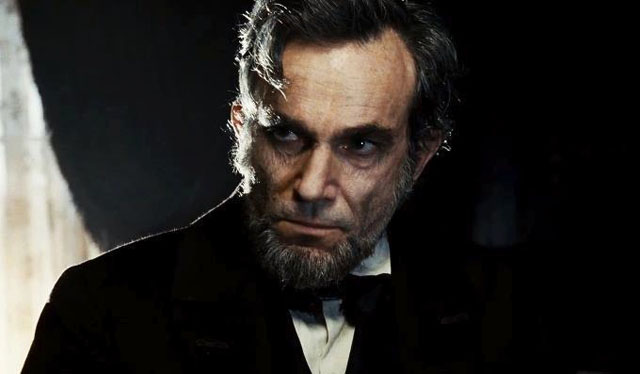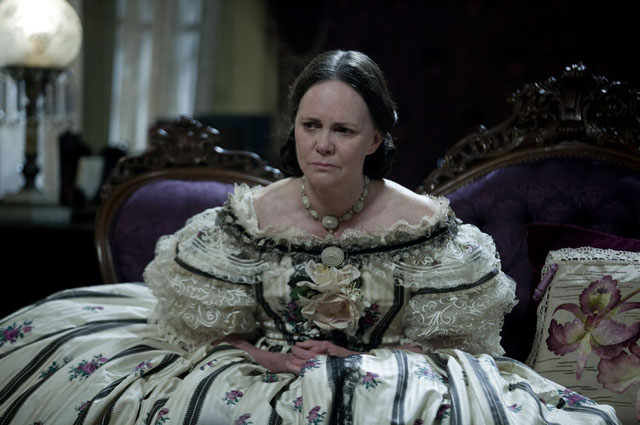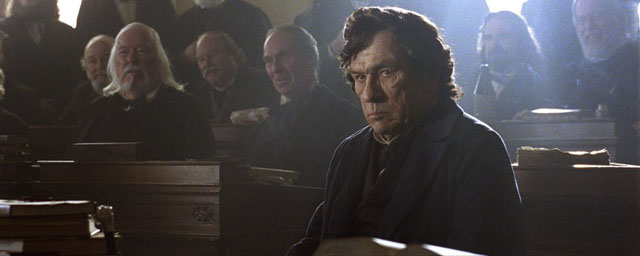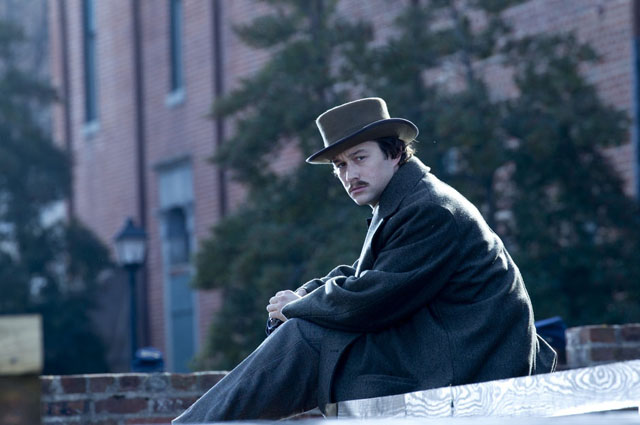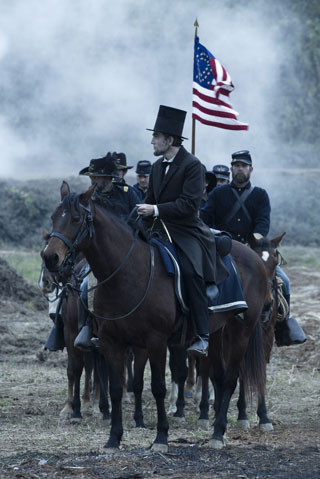Steven Spielberg’s Lincoln doesn’t officially premiere until it closes the AFI Fest on November 8, one day before it’s theatrical opening. But there was a “Secret Screening” at the New York Film Festival last night, and moments after the credits rolled, it seems, the tweets began flying. Moments later, the tweet collections rolled out. Among the most comprehensive of these are Matt Singer‘s at Criticwire, the Guardian‘s, and the Hollywood Reporter‘s, and to me, of all of the immediate first impressions, three are standouts: @reverse_shot: “‘Lincoln’: Sophisticated, erudite political procedural from Spielberg and Kushner. Genuinely superb. #nyff” @BilgeEbiri: “Spielberg’s ‘Lincoln’ is the best film Roberto Rossellini never made. Also one of the best Spielberg did make. #notareview” And @eug: “Just saw ‘Lincoln’ at #NYFF. Swept up by grand Americana theatricality & strong perfs. 1800s West Wing? A bit. Engrossing political melodrama!”
Steven Zeitchik in the Los Angeles Times: “Centering on Abraham Lincoln’s attempt to pass the 13th Amendment outlawing slavery in the waning days of the Civil War, the movie is dialogue-heavy, focusing on legislative process and party politics as Lincoln and his aides try to win the necessary votes from both fellow Republicans and Democrats across the aisle. There is also a moral crisis at the center of the film, as Lincoln (Daniel Day-Lewis) is forced to confront the fact that expediting the end of the war could mean jeopardizing the passage of the amendment. Lincoln and his wife, Mary Todd (Sally Field), are also locked in a battle over whether to allow son Robert [Joseph Gordon-Levitt] to enlist in a conflict that appears to be over.”
“The screenplay from Pulitzer prize-winner Tony Kushner focuses on just the last four months of Lincoln’s life,” adds Katey Rich, writing for the Guardian. As Lincoln works toward passage of the 13th Amendment, the “backroom deals and legal hurdles to make that happen are immensely complicated, but after some bulky exposition this wheeling and dealing among lawmakers makes for the film’s strongest scenes. Secretary of State William Seward (David Strathairn) hires a trio of hooligans (John Hawkes, Tim Blake Nelson and James Spader) to rustle up votes for the amendment through whatever means necessary, while on the floor of the House of Representatives, anti-slavery lawmaker Thaddeus Stevens (a gloriously scene-stealing Tommy Lee Jones) bellows at pro-slavery Fernando Wood (Lee Pace), with the roomful of men around them banging on their desks and shouting over each other. If only modern American politics were remotely as entertaining.”
“At two hours and 30 minutes or so (no one was quite sure of the runtime beforehand), Lincoln contains only a single battle scene in its opening seconds,” writes Indiewire‘s Eric Kohn. “The rest is pure talk, a keen dramatization of Doris Kearns Goodwin’s tome Team of Rivals, that delivers an overview of Lincoln’s crowning achievement in chunks of strategy talk. Ostensibly a well-acted history lesson, it captures the turmoil of the period by observing Lincoln at work rather than wasting time valorizing him.”
“Throughout his career, Daniel Day-Lewis has given us a number of memorable characters, and his portrayal of Abraham Lincoln is one of the best,” writes Josh Lasser at Hitfix. Adds Christopher Rosen at the Huffington Post: “Think of Lincoln as the anti-Daniel Plainview, the There Will Be Blood character that won Day-Lewis a second Best Actor trophy in 2007. As portrayed by Day-Lewis, Lincoln is fierce, but also kind-hearted; he lives by a strict moral code, but isn’t afraid to bend the rules to make sure others do the right thing. It’s a multifaceted look at the 16th president, one that Kushner said took years to perfect.”
Cinematographer Janusz Kamiński “does a commendable job of making an inherently unattractive palette look borderline beautiful, especially when dealing with the tonalities of chiaroscuro, but a mostly ugly palette it ultimately is,” finds Rodrigo Perez at the Playlist. “Thankfully, John Williams’s score, easily the worst offender in Spielberg’s War Horse, is, like the picture, solemn, well-controlled and moving with a dignified air of grace.”
Listening (10’01”). Movies.com‘s Erik Davis and David Ehrlich discuss the film as they stroll out of last night’s screening.
Updates: “Lincoln ultimately compromises as a musty (if occasionally rousing) legal drama,” writes David Ehrlich at Movies.com: “erudite but bloated, the film fails to make the most of its impeccable cast, wasting a Daniel Day-Lewis performance that’s so hypnotizing and human it could be confused for a resurrection…. The movie has the opportunity to be precise, and instead it tries to be definitive. As a result, Lincoln is a stirring history lesson, sure to be a new favorite film for substitute teachers across the country, but a film so determined to help us remember our history can’t afford to be so easily forgotten.”
Movieline‘s Brian Brooks reports on the onstage Q&A.
Update, 10/11: Via Erik Davis at Movies.com, a Q&A with Spielberg and Day-Lewis:
Update, 10/21: “Spielberg and screenwriter Tony Kushner’s portrait of the Lincoln White House is as a place where the ideals of liberty and the ghosts of slavery interact with the base calculations of realpolitik,” writes Bilge Ebiri. “Kushner’s Angels in America, of course, presented us with a highly symbolic ‘fantasia’ of personal stories, history, and mythology; it was a world where individuals, historical figures, and spectral beings interacted and conjoined, sometimes played by the same actors. Though Lincoln is more grounded in reality, scratch its surface and I think you’ll find a similarly complex network of symbols and myths. This time, however, Kushner’s mytho-poetic conceits have been joined to the power and clarity of Spielberg’s direction. The results are awe-inspiring.”
Update, 10/25: For Time, Jessica Winter profiles Day-Lewis and interviews Kushner, while Rick Stengl interviews Spielberg.
Update, 10/31: In the New York Times, Charles McGrath profiles Daniel Day-Lewis, who, at 55, “has already won two best actor Oscars, and his performance here, tender and soulful, convincingly weary and stoop-shouldered, will almost certainly earn him a nomination. He’s neither as zombified as Walter Huston in D.W. Griffith’s 1930 biopic Abraham Lincoln, nor as brash and self-assured as Henry Fonda in John Ford’s Young Mr. Lincoln (1939), nor as stagy and ponderous as Raymond Massey, a year later, in Abe Lincoln in Illinois, in which he sounds, during the Lincoln-Douglas debates, a lot like the television evangelist Harold Camping proclaiming the end of the world once more.”
Updates, 11/3: “For all the pivotal American history recreated in Steven Spielberg’s Lincoln,” writes R. Kurt Osenlund in Slant, “one of the film’s most striking elements is its vast ensemble cast. Packed with familiar faces, the starry company brings to life a dense population of varied souls, each one’s world upended by abolition and the Civil War. Through these people, Lincoln makes palpable a wild cultural impact that spread like a spidery crack in glass. Every individual, no matter how briefly presented (the cameos range from Adam Driver to S. Epatha Merkerson), seems uniquely, yet universally, invested in this landmark moment in time, and the film’s frenzied display of moral murk and diversity trumpets the need for a calming voice of reason. Lincoln, it would appear, was that voice… [W]hat the movie finally communicates is that which seems most fortunate about Lincoln’s life: Though he died as a direct result of his tide-turning actions, the president seems to have been given just enough time in this world to change it.”
Updates, 11/5:
More viewing (4’26”). Louis C.K. as Lincoln on SNL.
“The gambit of Spielberg’s Lincoln is to humanize this almost mythic figure,” writes Chris Wisniewski at Reverse Shot. “Its triumph, thanks largely to an erudite and ambitious screenplay that places utter faith in the intelligence of its audience…, is to do so without trying to deconstruct his greatness. It is easy for filmmakers to chip away at the veneer of larger-than-life historical figures; it is far more difficult to acknowledge genius in a mere human and then construct a movie that attempts to capture both that genius and his or her humanity.”
“Neither Obama nor Mitt Romney is foolish enough to compare himself directly to Lincoln,” comments Salon‘s Andrew O’Hehir, “but whichever man is elected on Tuesday faces a political landscape nearly as divided and poisonous as the one confronted by the 16th president. Moreover, this year’s election will vividly illustrate that the schisms of the Civil War—over differing visions of justice and equality, competing ideas about states’ rights and federal power, cultural divisions between North and South—have yet to heal, long after the passage of many generations and enormous waves of demographic change ought to have rendered them irrelevant. I have no doubt about which candidate Steven Spielberg and Tony Kushner believe comes closer to the Lincolnian ideal, but their remarkable film Lincoln offers urgent lessons to both candidates, and the rest of us, about how to wield political power in times of crisis. Whether those lessons still pertain in the dysfunctional climate of the 21st century is another matter.”
Spielberg and Kushner “prove the worth of a smart, riveting and dignified drama,” argues Pete Hammond at Box Office.
Jessica A. Koslow talks with Kushner for the LA Weekly.
Updates, 11/7: “Lincoln is an engrossing, genuinely entertaining film that is also an inspiring piece of Americana in the finest sense of the term,” writes Glenn Kenny at MSN Movies.
“It’s splendid enough to make me wish Spielberg would make a ‘prequel’ to this instead of another goddamn Indiana Jones picture,” writes New York‘s David Edelstein. “His filmmaking is deceptively simple—the kind of simplicity only a master can achieve.”
American Film talks with Doris Kearns Goodwin about the time Spielberg asked to take a first peek at Team of Rivals: The Political Genius of Abraham Lincoln.
Sean Axmaker looks back on ten of Day-Lewis’s “most committed” performances and tells “the stories behind the incarnations.”
Vanity Fair‘s Julie Miller talks with Sally Field about “her years-long audition process, Daniel Day-Lewis’s unprecedented generosity, and the heart break she risked for the film.”
Updates, 11/11: Before launching into the next round of reviews, let’s note that Slate‘s Forrest Wickman has a terrific guide to the historical accuracy of the film, including links to a gallery that places early photos of key figures alongside the actors who portray them and a separate piece on the sanity of Mary Todd Lincoln. Also, for a Smithsonian Magazine cover story, Roy Blount Jr. talks with Spielberg, Kushner, and Goodwin.
For the New York Times‘ A.O. Scott, “the genius of Lincoln, finally, lies in its vision of politics as a noble, sometimes clumsy dialectic of the exalted and the mundane. Our habit of argument, someone said recently, is a mark of our liberty, and Mr. Kushner, whose love of passionate, exhaustive disputation is unmatched in the modern theater, fills nearly every scene with wonderful, maddening talk.” And: “To paraphrase what Woodrow Wilson said of Griffith, Mr. Spielberg writes history with lightning.”
Graham Fuller for Artinfo: “Completing Spielberg’s unofficial trilogy of films about slavery and its legacy, following The Color Purple (1985) and Amistad (1997), it is the sober, mature work of a director who excels whenever he reins in his natural tendency to sentimentalize his stories and doesn’t slip into default mode as a brilliant but sometimes facile metteur-en-scène.”
Writing for Tablet, J. Hoberman notes that it’s hardly “difficult to make the connection between a vilified president who is essentially a conciliatory moderate surrounded by angry adversaries and mistrustful allies and the newly re-elected leader of our own divided land…. While it would be an overstatement to say that American Jews popularized the notion of Lincoln as liberator, it is true that the development of that Lincoln coincides with the Americanization of Jewish immigrants—and particularly the coming of the New Deal….A Baltimore rabbi called the slain president ‘spirit of our spirit and essence of our essence,’ with a nature that was ‘truly Judaic.’ Sixty years later, the comparison between Lincoln and Moses was commonplace.”
“The man portrayed here possesses the gifts we should prize most in a president,” argues the Chicago Reader‘s J.R. Jones: “he takes the long view of history but apprehends the present circumstance, and he has the iron will needed to reconcile the grimy business of governing with the highest ideals of the American experiment. I would never have expected this lesson from Spielberg, a sentimental man who numbers the mythmaking John Ford among his cinematic heroes.”
Lincoln is “one of the most mature films Spielberg has made,” agrees Time Out Chicago‘s Ben Kenigsberg.
“Though his project here is clearly one of conscious self-restraint, Spielberg can’t resist the occasional opportunity for patriotic tear-jerking, usually signaled by a swell of John Williams’s symphonic score,” writes Slate‘s Dana Stevens. “But in between, there are long stretches that are as quiet, contemplative, and austere as anything Spielberg has ever done.”
For Salon‘s Andrew O’Hehir, Spielberg “has outdone Griffith and Ford and then some, crafting a thrilling, tragic and gripping moral tapestry of 19th-century American life, an experience that is at once emotional, visceral and intellectual.”
The Boston Globe‘s Ty Burr: “Sweet Lord, how refreshing it is to hear dialogue that crackles with wit and personality—with actual ideas.”
“There is more than a bit of hindsight liberal-conscience streaked through the film,” notes Nicolas Rapold in the L, “but we get a sense of the multifaceted positions on shifting ground that are required of a politician attempting to effect change—the unfashionable notion of representative democracy, most bluntly stated by Jones’s Stevens, leading people even against their will into a better state of the union.”
Time‘s Richard Corliss suggests that Lincoln “joins Argo as a movie that dares to remind American moviegoers that its government can achieve great victories against appalling odds.”
“Anyone paying attention won’t miss the resemblance between the past and the present,” writes Keith Phipps at the AV Club.
Day-Lewis’s performance is “the best special effect that you’ll see in a movie theater this year,” writes the Stranger‘s Paul Constant.
“If this is Oscar bait, then that term has somehow been radically altered,” writes Joshua Rothkopf in Time Out New York. “Defiantly intellectual, complex and true to the shifting winds of real-world governance, Lincoln is not the movie that this election season has earned—but one that a more perfect union can aspire to.”
More from Roger Ebert (Chicago Sun-Times, 4/4), Richard Lawson (Atlantic Wire), Alison Willmore (Movieline, 9/10), Stuart Weinstock (Cinespect), and Stephanie Zacharek (Film.com).
Updates, 11/12: “The true tussle of the movie,” argues Anthony Lane in the New Yorker, “is between the Spielberg who, like a cinematic Sandburg, is drawn aloft toward legend—hardly an uncommon impulse when dealing with Lincoln—and the Spielberg who is tugged down by Kushner’s intricate screenplay toward documentary grit. You can never tell which of the two tendencies, the visionary or the revisionist, will come out on top.”
Boris Kachka profiles Sally Field for New York.
Updates, 11/13: The New Yorker‘s Richard Brody finds it “tempting to think of Lincoln as a movie for children, a simplified version of history, a civic-minded primer that illustrates two contradictory notions and reconciles them in a relatively neat and untroubled package. On the one hand, Lincoln comes off as the best lawyer and strategist around, a sort of politician-in-chief who knows what he wants to achieve, understands better than anyone around him the kind of lawmaking that’s needed to achieve it, and insinuates, cadges, exhorts, deceives, and otherwise threads his plan to fruition. At the same time, he’s guided by a single, unshakeable principle—the elimination of slavery—that drives him relentlessly forward, sacrificing other worthy notions on either side, whether ending the war as soon as possible and reintegrating the South into the Union, or pushing ahead to offer reparations that would bring freed slaves toward full practical equality. Spielberg gives Lincoln the kind of idée fixe that motivates most of his protagonists. For all the division that Kushner’s script inscribes in the character… and for all the preternatural grandeur that Day-Lewis brings to the performance, Spielberg’s Lincoln is a fleshed-out cartoon, an Indiana Jones from the history books.”
“The first few minutes of Lincoln play out like a parody of the expectations of Steven Spielberg’s detractors,” suggests Alan Scherstuhl, writing for the LA Weekly. Three Union soldiers “recite back [to Lincoln] the words of the Gettysburg Address as if it’s already something their teachers demand they memorize. Warmly, Lincoln dismisses the boys… But then he ponders the words they’ve parroted back at him, and as his face hardens toward the profound determination that will power the rest of the film and his life… Amistad notwithstanding, a new Spielberg history film is never just a movie: It’s future homework, a multimedia addition to the Smithsonian, a new official imaginative record. Even people who haven’t actually seen Saving Private Ryan know the gut-scraping crack-up of its D-Day, and it might not be possible for mediated young folks to dream of Auschwitz in color. The staying power of these films—due as much to their artistic power as for their Time-cover, 60 Minutes marketing—makes moments like Lincoln‘s bathetic opening all the more sour for Spielberg’s critics. It’s easy to carp, ‘Is it now orthodox American belief that Lincoln sat around like Robin Williams in Hook thinking, “If those kids believe in me, I just might, too”?’… Lincoln is the work of a different director, one truly fascinated by why his subjects do what they do, one who invests each moment with the artistry he has often reserved for setpieces. Despite that scrupulousness, when staring into a subject this grand he sometimes blinks.”
Updates, 11/14: For David Thomson, writing for the New Republic, “to see it in the immediate aftermath of Barack Obama’s second election is the way to go. You can tell yourself that the resulting surge of emotion is a matter of chance, or God-given, but then you realize that Steven must have organized it this way. He foresaw our moment, he designed his opening, and Lincoln is especially momentous as the second Obama administration realizes there is no peace for the elected. It would have had a different resonance if the November 6 result had gone the other way. But Steven—not for the first time—planned an opening that would work either way.”
Cinematographer Janusz Kaminski tells Vulture‘s Kyle Buchanan how he captured a memorable shot from each of eleven films he’s worked on with Spielberg.
Updates, 11/15: “Even when filming scenes of chaos or carnage, there’s an everything-in-its-place precision to Steven Spielberg’s staging,” writes Kimberley Jones in the Austin Chronicle. “His is an old-fashioned style of moviemaking that can produce soaring entertainment or, alternately, a fussed-over theatricality. Minute to minute, Lincoln moves between these extremes.”
“As always, Spielberg has a tendency to underline twice when once would do,” writes Sam Adams in the Philadelphia City Paper, “but Day-Lewis runs with the movie’s pedantic bent, enhancing one argument with a Euclidean theorem. The painstaking detail that goes into tracking the amendment’s path toward approval is at its core an impassioned defense of representative democracy, with all its flaws intact. It’s like the most eloquent episode of Schoolhouse Rock ever made.”
“There’s no verb left for what Day-Lewis does onscreen,” writes Scott Wilson in the Nashville Scene, “and that’s been true for a while. But whatever studied calculations led him to his Lincoln, with this pained carriage and this cracker-barrel voice and these bottomless silences, the result is seamless and organic—not a performance or even another of his extreme inhabitations but a possession.”
President Obama will host a screening tonight at the White House. Kimberly Nordyke has details in the Hollywood Reporter.
Kushner’s a guest on Fresh Air.
Updates, 11/16: Josef Braun finds that Spielberg “seems to understand that what’s gripping and fascinating about this story requires and rewards our careful attention; to beat us over the head with the gravity of every scene would only distract from the delight of the details.”
Kushner’s let on that he’s already writing on a new project for Spielberg, reports Cain Rodriguez at the Playlist.
“And so the author of Angels in America buys into the Doxa that heterosexuality is a self-evident truth whereas Teh Ghey is invariably ‘speculation.'” But David Ehrenstein‘s not buying.
Updates, 11/18: First, via Ray Pride, the SoundWorks Collection talks with Skywalker Sound’s Sound Designer Ben Burtt about his work on Lincoln:

